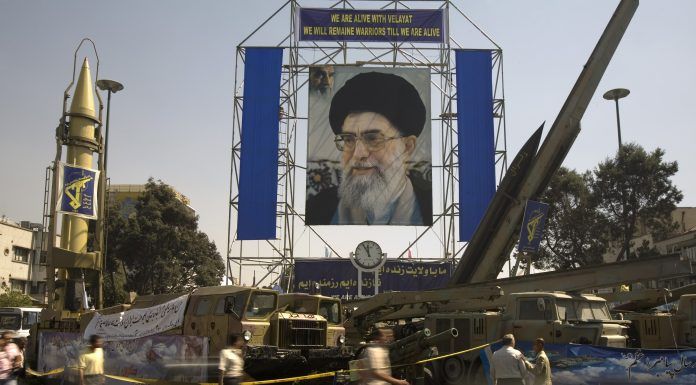Iran’s Foreign Minister Mohammad Javad Zarif has criticized European governments for not condemning America’s “economic terrorism” and trying to “appease” U.S. President Donald Trump instead.
“A year after the U.S.’s unlawful abrogation of JCPOA, Europe cannot muster the political will to defy US #Economic TERRORISM,” Mr. Zarif tweeted in English on April 3. “Not even by setting up a single banking channel for humanitarian aid. E3 are instead busy appeasing @realDonaldTrump by pressuring UN over our defensive capabilities.”
[aesop_image img=”https://kayhanlife.com/wp-content/uploads/2019/04/ZARIF-TWEET2390344565.jpg” panorama=”off” align=”center” lightbox=”off” captionposition=”center” revealfx=”off” overlay_revealfx=”off”]
In an interview with the official website of Iran’s Supreme Leader Ayatollah Ali Khamenei on April 3, Zarif said: “The EU has always viewed the JCPOA [Joint Comprehensive Plan of Action, better known as the Iran nuclear deal] as an achievement. They never had the capability and the resolve to stand up to the U.S. We never pinned our hopes on the Europeans. We will, however, pressure them to honor their commitments.”
The UK, Germany, and France have condemned Iran’s ballistic missile program which in their view violates the terms of the JCPOA and UN Security Council Resolution 2231. The EU has yet to activate the Instrument to Support Trade Exchanges (INSTEX), a special-purpose vehicle (SPV) established in January 2019 by France, Germany, and the UK to facilitate non-dollar trade with Iran. All three countries have called on the UN Secretary General Anthony Guterres to punish Iran over its ballistic missile program.
Political observers believe that the EU and the U.S. are united in their concerns over Iran’s ballistic missile tests and the Islamic Revolutionary Guards Corps’ (IRGC) regional ambitions. However, the Islamic Republic enjoys the support of a powerful lobby in Europe. It is conceivable that asking the UN to investigate Iran’s ballistic missile program might be a clever ploy aimed at confirming the findings of the International Atomic Energy Agency (IAEA) on the Islamic Republic’s compliance with the terms of the JCPOA. However, Iran unsuccessfully tried to launch two satellites into space in the closing months of 2018. The IRGC also tested its long-range Hoveizeh and Dezful cruise missiles in February of this year.
The U.S. State Department was quick to support any preconditions set by the EU for Iran before activating the INSTEX. However, the White House has not responded to an investigation into Iran’s missile program by the UN. The U.S. and the EU are on the same page regarding the issue – albeit reluctantly. The Islamic Republic would resort to any tactic to ensure its survival even negotiating its missile program. Meanwhile, many European governments are walking a diplomatic tightrope by trying to maintain friendly ties with the U.S. and fulfilling their commitments to the JCPOA without compromising their economic interests.
In an interview with the Majlis (Iranian Parliament) information website, the ICANA News Agency, on April 4, Javad Karimi Ghodoosi, a member of the Committee on National Security and Foreign Policy said: “President Hassan Rouhani’s government is engaged in negotiations with France on Iran’s missile program.” Pro-Iranian lobbies in Europe are hoping to muster support for Iran’s missile activities.
Iran’s former charge d’affaires to the UK (1982-1986) Seyyed Jalal Sadatian recently told Kayhan London: “The Islamic Republic will never abandon its missile program even if it is threatened with a nuclear strike. Iran’s missiles pose no threats to Europe. They are a deterrent against Israel, Saudi Arabia and the United Arab Emirates (UAE).” Mr. Sadatian is in favor of negotiations with Europe over the missile program.
It is, therefore, possible that the Islamic Republic and Europe could agree on Iran’s missile activities. Foreign Minister Zarif has also said everything is negotiable within the JCPOA framework. However, so far talks have yielded no tangible results, and that is why Europe has asked the UN to reprimand Tehran.
The EU will not implement the INSTEX until Iran halts all ballistic missile tests, pulls out of Syria, curbs its regional activities and stops threatening Israel.
[Translated from Persian by Fardine Hamidi]


